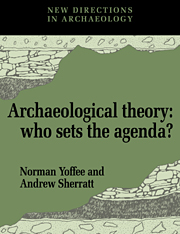Book contents
- Frontmatter
- Contents
- List of figures
- List of contributors
- Introduction: the sources of archaeological theory
- PART I THE SOCIAL CONTEXT OF ARCHAEOLOGICAL THEORY
- PART II ARCHAEOLOGICAL THEORY FROM THE PALAEOLITHIC TO THE STATE
- PART III CASE STUDIES IN ARCHAEOLOGICAL THEORY AND PRACTICE
- 7 When is a symbol archaeologically meaningful?: meaning, function, and prehistoric visual arts
- 8 Re–fitting the “cracked and broken façade”: the case for empiricism in post–processual ethnoarchaeology
- 9 Communication and the importance of disciplinary communities: who owns the past?
- PART IV EPILOGUE
- Index
8 - Re–fitting the “cracked and broken façade”: the case for empiricism in post–processual ethnoarchaeology
Published online by Cambridge University Press: 03 May 2010
- Frontmatter
- Contents
- List of figures
- List of contributors
- Introduction: the sources of archaeological theory
- PART I THE SOCIAL CONTEXT OF ARCHAEOLOGICAL THEORY
- PART II ARCHAEOLOGICAL THEORY FROM THE PALAEOLITHIC TO THE STATE
- PART III CASE STUDIES IN ARCHAEOLOGICAL THEORY AND PRACTICE
- 7 When is a symbol archaeologically meaningful?: meaning, function, and prehistoric visual arts
- 8 Re–fitting the “cracked and broken façade”: the case for empiricism in post–processual ethnoarchaeology
- 9 Communication and the importance of disciplinary communities: who owns the past?
- PART IV EPILOGUE
- Index
Summary
A well–established dialogue concerning “post–processualism” reflects a current lack of consensus in archaeological theory. Post–processualists advocate a particularistic, hermeneutic approach to archaeological inquiry and thereby challenge the “explicitly scientific” approach of what has now become known as processual archaeology. This debate has produced a substantial corpus of literature, only some of which will be considered here. Ethnographic data form the foundation for many archaeological interpretations, and have been used in both processual and post–processual frameworks. Moreover, ethnoarchaeology represents a research strategy of increasing importance in supplying both processual and post–processual archaeologists with ideas for interpretation. Accordingly, this analysis broaches the post–processual discussion by focusing on strengths and limitations of ethnoarchaeological research.
In the post–processual spirit of polemic strategies (Shanks and Tilley 1989: 8), this paper challenges the premise that “varieties of empiricism do not form an appropriate medium for a materialist practice” (ibid. 1989: 44). Embodied in Hodder's (1986: 79) claim that empirical science is a “cracked and broken facade” (and resounded elsewhere, e.g., Shanks and Tilley 1989: 3), the paper focuses on the domain of current ethnoarchaeological research and argues that archaeologists and ethnoarchaeologists are compelled by the nature of their data to maintain methodological rigor in research.
This paper considers symbolic analyses of material culture that are conducted within traditional (i.e., nonindustrialized) societies as post–processual ethnoarchaeological research.
- Type
- Chapter
- Information
- Archaeological TheoryWho Sets the Agenda?, pp. 93 - 104Publisher: Cambridge University PressPrint publication year: 1993
- 6
- Cited by

